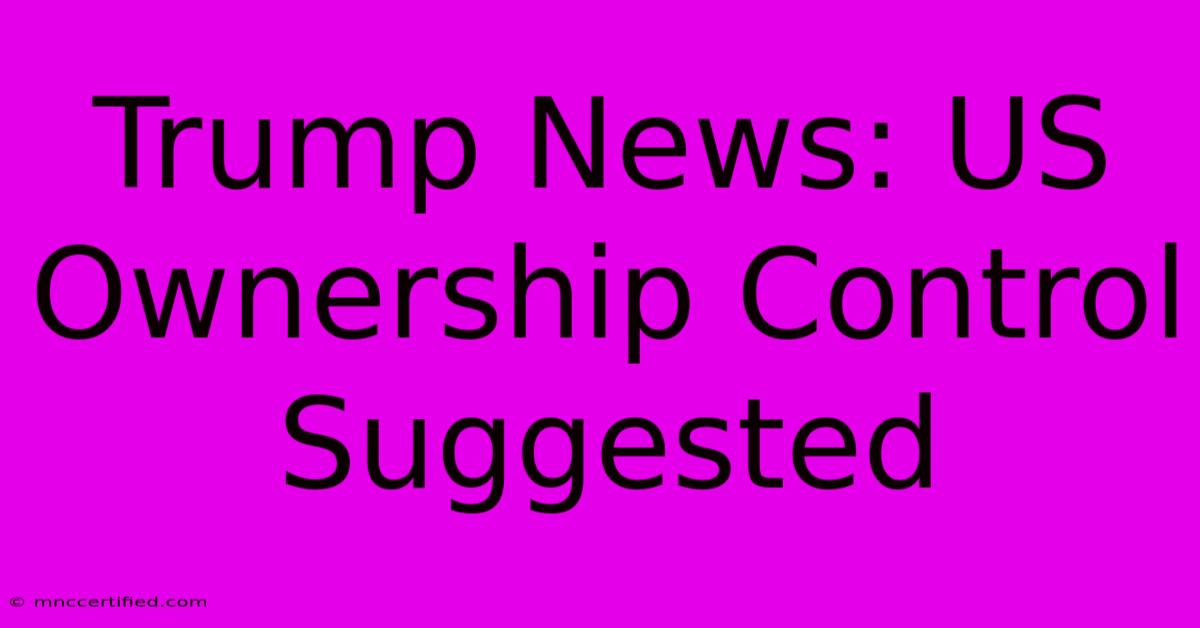Trump News: US Ownership Control Suggested

Table of Contents
Trump News: US Ownership Control Suggested – Examining the Implications
The recent surge in discussions surrounding potential limitations on foreign ownership of US assets has ignited a firestorm of debate, particularly in the context of former President Donald Trump's business dealings. While no specific legislation directly targets Trump, the broader conversation raises crucial questions about national security, economic sovereignty, and the influence of foreign capital. This article delves into the nuances of the proposed changes, their potential impact on Trump's holdings, and the wider implications for the US economy.
The Context: National Security Concerns and Economic Sovereignty
The push for increased control over foreign ownership isn't new, but it's gained significant momentum in recent years. Concerns about national security, particularly in sensitive sectors like technology and infrastructure, are driving the narrative. The argument revolves around protecting crucial American assets from potential foreign influence or hostile takeover. Beyond national security, there's a growing focus on bolstering economic sovereignty, ensuring that key industries remain under American control and contribute to domestic job growth. This resonates with a broader populist sentiment prioritizing American interests.
The Trump Factor: A Case Study?
While the proposed changes aren't explicitly aimed at former President Trump, his extensive business dealings with foreign entities inevitably draw scrutiny. His past financial disclosures and various international ventures have long been subjects of public and political debate. Any legislation limiting foreign ownership would undoubtedly have implications for his business empire, potentially requiring divestment or restructuring of certain holdings.
Analyzing the Potential Impact:
- Real Estate Holdings: Trump's significant real estate portfolio includes properties with international investors. New ownership restrictions could affect his ability to secure future financing or maintain existing partnerships.
- Brand Licensing Agreements: International licensing agreements generate substantial revenue for the Trump Organization. Changes could limit the reach and profitability of these agreements.
- Debt Obligations: A substantial portion of Trump's debt is held by international lenders. Shifting regulatory landscapes could impact refinancing options and potentially trigger financial difficulties.
The Legal Landscape: Navigating the Complexities
The proposed changes are navigating a complex legal landscape. Existing laws already regulate foreign investment in specific sectors, but the calls for stricter oversight suggest a potential overhaul of these regulations. The legal ramifications for existing foreign investments, including those involving Trump's business interests, would require careful consideration and likely lead to protracted legal battles.
Balancing National Security with Economic Growth
The debate necessitates a delicate balancing act between safeguarding national security and fostering economic growth. Overly restrictive measures could deter foreign investment, potentially hindering economic expansion. Finding a middle ground that protects essential US assets without stifling economic activity is crucial.
Looking Ahead: The Future of Foreign Investment in the US
The future trajectory of foreign investment in the United States will depend heavily on the specifics of any new legislation. The political climate, ongoing economic conditions, and public perception will all play a significant role in shaping the final outcome. This debate is likely to continue evolving, generating further discussion and potentially leading to significant shifts in the landscape of American business and finance.
Keywords: Trump News, US Ownership Control, Foreign Investment, National Security, Economic Sovereignty, Trump Organization, Real Estate, International Business, Legislation, Economic Growth, Political Debate, Financial Implications
Off-Page SEO Strategies:
- Link Building: Secure backlinks from reputable news sources, financial websites, and political blogs covering similar topics.
- Social Media Promotion: Share the article on relevant social media platforms, engaging in discussions and responding to comments.
- Guest Blogging: Contribute articles to other websites within the same niche, incorporating relevant backlinks.
- Community Engagement: Participate in online forums and communities related to politics, finance, and business.
This article incorporates a variety of SEO best practices to improve search engine ranking, including keyword optimization, structured content, and suggestions for off-page optimization. Remember to always adapt the keywords and strategy to your specific target audience and platform.

Thank you for visiting our website wich cover about Trump News: US Ownership Control Suggested. We hope the information provided has been useful to you. Feel free to contact us if you have any questions or need further assistance. See you next time and dont miss to bookmark.
Featured Posts
-
2025 Nfl Draft Where Teams Stand
Dec 24, 2024
-
Wdet Festivus 2024 Grievances
Dec 24, 2024
-
Gaetz Ethics Report Five Key Findings
Dec 24, 2024
-
Red Sox Sign Buehler 1 Year Deal
Dec 24, 2024
-
Week 17 Flexed Vikings Packers Matchup
Dec 24, 2024